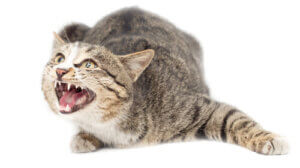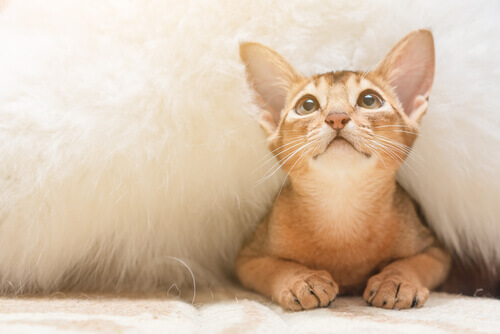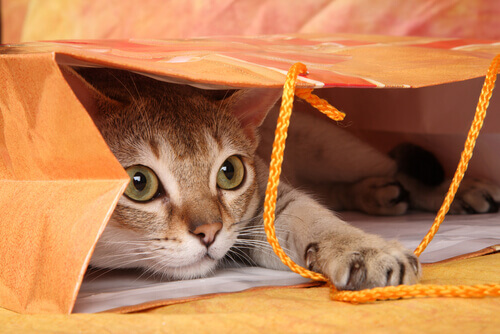Is it True that Cats Suffer from Anxiety?


Written and verified by the biologist Samuel Sanchez
Anxiety, unfortunately, is a pathology that doctors are diagnosing more and more among the general population. Most of us know the symptoms: Sweating, chest pain, lack of concentration, increased fatigue, etc. In this modern society full of continuous stimuli and responsibilities, chronic nervousness is the order of the day. But is this condition exclusive to humans, or can other animals experience the same? Is it true that cats suffer from anxiety as well?
Many doubt the emotional capacity of animals. However, pets can experience anxiety as well. After all, this sensation puts our bodies on alert and prepares them for dangerous situations. In other words, it’s essential in nature when it comes to survival.
Each animal has its own perception
First of all, it’s important to understand that anxiety depends on two things, mainly:
- The nature of the stimuli that causes the sensation
- The animal’s predisposition to experiencing anxiety
It’s important to keep in mind that animals, just like humans, are individuals with their own unique personalities and experiences. Therefore, some cats are more nervous and others more relaxed. So, what may produce indifference in one cat can lead to anxiety in another.
Each owner knows their pet better than anyone. So, observing your animal in order to decipher their emotional characteristics will be key in making a diagnosis. Just the same, there are two general environmental factors that can cause anxiety in cats.

The physical environment
Some of these physical factors can make it more likely for cats to suffer from anxiety:
- An absence of places that allow for the three-dimensional use of space, like scratching posts, towers, or furniture they can climb.
- Lack of individual space. In other words, a place where a cat can isolate itself from other people and animals.
- Inadequate or insufficient access to food and water dishes. This is especially common when several cats live in the same home, which can lead to conflicts.
- Changes in a cat’s physical surroundings. A move, the constant moving around of play structures, food and water bowls, etc.
- An environment that’s too monotonous. It’s one thing to respect an animal’s space, but they still need new stimuli. Cats are curious by nature, and new toys and challenges are necessary for their mental activation.
The social environment
There are also various social factors that can cause owners to suspect that their cats suffer from anxiety:
- Lack of harmony among animals living in the same home, whether it’s another cat or a different species.
- Poor handling of the animal by its owners. For example, too much handling and contact, physical punishment, yelling, loud noises, etc.
- The arrival of a new person in the home, especially if it’s a child or newborn that causes more noise than usual.
How to recognize when cats suffer from anxiety
Just as with people, an anxiety disorder can appear in countless ways and involves both behavioral and physical symptoms.
The list of signs is practically endless, but we’ll show you some changes that you should look out for:
- Unprecedented aggression, an increase in grooming, and spasmatic contractions of the dorsal muscles of the animal’s torso. These symptoms pertain to a pathology known as feline hyperesthesia syndrome.
- Reduced appetite or anorexia.
- Increased and disproportional periods of rest.
- Marking with urination or feces outside of the litter box.

How to treat anxiety in cats?
Anxiety can have a variety of causes, so treatment may vary in its complexity.
Treating a cat with anxiety due to a phobia or past experience is very different than treating a cat that suffers from a lack of stimuli.
Therefore, it’s always important to know a cat’s history prior to it coming to your home. At the same time, you should consult with your vet if you notice any changes in the animal’s behavior.
In general, an increase in stimuli tends to help in cases of cats with generalized anxiety (without a concrete motive). This will keep the animal busy and reduce stress through physical exercise. Scratching posts, new toys, and interaction with the owner are all good options. In short, environmental enrichment is essential.
Just the same, if these changes don’t produce the desired effect, there are a series of anxiolytic pharmaceutical medications for cats. Of course, a veterinarian must always prescribe and control their administration.
Anxiety, unfortunately, is a pathology that doctors are diagnosing more and more among the general population. Most of us know the symptoms: Sweating, chest pain, lack of concentration, increased fatigue, etc. In this modern society full of continuous stimuli and responsibilities, chronic nervousness is the order of the day. But is this condition exclusive to humans, or can other animals experience the same? Is it true that cats suffer from anxiety as well?
Many doubt the emotional capacity of animals. However, pets can experience anxiety as well. After all, this sensation puts our bodies on alert and prepares them for dangerous situations. In other words, it’s essential in nature when it comes to survival.
Each animal has its own perception
First of all, it’s important to understand that anxiety depends on two things, mainly:
- The nature of the stimuli that causes the sensation
- The animal’s predisposition to experiencing anxiety
It’s important to keep in mind that animals, just like humans, are individuals with their own unique personalities and experiences. Therefore, some cats are more nervous and others more relaxed. So, what may produce indifference in one cat can lead to anxiety in another.
Each owner knows their pet better than anyone. So, observing your animal in order to decipher their emotional characteristics will be key in making a diagnosis. Just the same, there are two general environmental factors that can cause anxiety in cats.

The physical environment
Some of these physical factors can make it more likely for cats to suffer from anxiety:
- An absence of places that allow for the three-dimensional use of space, like scratching posts, towers, or furniture they can climb.
- Lack of individual space. In other words, a place where a cat can isolate itself from other people and animals.
- Inadequate or insufficient access to food and water dishes. This is especially common when several cats live in the same home, which can lead to conflicts.
- Changes in a cat’s physical surroundings. A move, the constant moving around of play structures, food and water bowls, etc.
- An environment that’s too monotonous. It’s one thing to respect an animal’s space, but they still need new stimuli. Cats are curious by nature, and new toys and challenges are necessary for their mental activation.
The social environment
There are also various social factors that can cause owners to suspect that their cats suffer from anxiety:
- Lack of harmony among animals living in the same home, whether it’s another cat or a different species.
- Poor handling of the animal by its owners. For example, too much handling and contact, physical punishment, yelling, loud noises, etc.
- The arrival of a new person in the home, especially if it’s a child or newborn that causes more noise than usual.
How to recognize when cats suffer from anxiety
Just as with people, an anxiety disorder can appear in countless ways and involves both behavioral and physical symptoms.
The list of signs is practically endless, but we’ll show you some changes that you should look out for:
- Unprecedented aggression, an increase in grooming, and spasmatic contractions of the dorsal muscles of the animal’s torso. These symptoms pertain to a pathology known as feline hyperesthesia syndrome.
- Reduced appetite or anorexia.
- Increased and disproportional periods of rest.
- Marking with urination or feces outside of the litter box.

How to treat anxiety in cats?
Anxiety can have a variety of causes, so treatment may vary in its complexity.
Treating a cat with anxiety due to a phobia or past experience is very different than treating a cat that suffers from a lack of stimuli.
Therefore, it’s always important to know a cat’s history prior to it coming to your home. At the same time, you should consult with your vet if you notice any changes in the animal’s behavior.
In general, an increase in stimuli tends to help in cases of cats with generalized anxiety (without a concrete motive). This will keep the animal busy and reduce stress through physical exercise. Scratching posts, new toys, and interaction with the owner are all good options. In short, environmental enrichment is essential.
Just the same, if these changes don’t produce the desired effect, there are a series of anxiolytic pharmaceutical medications for cats. Of course, a veterinarian must always prescribe and control their administration.
All cited sources were thoroughly reviewed by our team to ensure their quality, reliability, currency, and validity. The bibliography of this article was considered reliable and of academic or scientific accuracy.
- Ansiedad felina, gattos.net. Recogido a 10 de junio en https://www.gattos.net/images/Publicaciones/Vanesa/ARTICULOANSIEDADFELINA.pdf
This text is provided for informational purposes only and does not replace consultation with a professional. If in doubt, consult your specialist.








